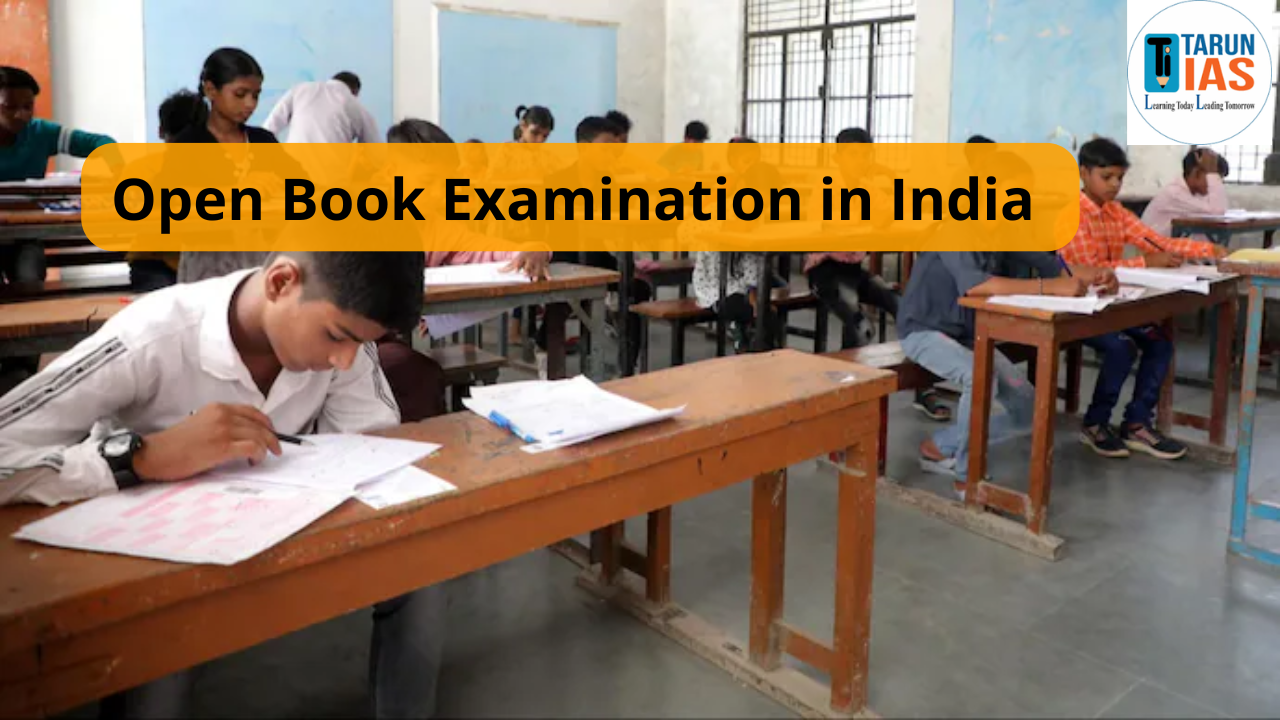Open Book Examination in India Introduction
- The Central Board of Secondary Education (CBSE) is set to bring a significant change to its assessment system by introducing Open Book Assessments (OBE) for Class 9 students starting in the academic year 2026-27.
- This move comes after a successful pilot study, which revealed strong support from teachers for the new evaluation method.

Understanding Open Book Examination (OBE) and Its Evolution in India
-
- Open Book Examination (OBE) is an innovative assessment approach where students are permitted to consult approved materials, such as textbooks and class notes, during the examination.
- Unlike traditional exams that primarily test memory, OBE focuses on students’ ability to interpret, analyze, and apply knowledge effectively.
- The key challenge in OBE is not memorization, but knowing how and where to find relevant information and applying it to solve problems.
- Types of Open Book Examination: OBEs are broadly categorized into two types:
-
-
- Restricted Open Book Assessment: Students can refer only to study materials approved by the exam-conducting authority.
- Free Open Book Assessment: Students are allowed to bring any material of their choice during the examination.
-
- History and Implementation of OBE in India: Open Book Examinations are not entirely new to the Indian education system. Key milestones include:
- 2014 – CBSE Open Text-Based Assessment (OBTA):
- Introduced for Class 9 (Hindi, English, Mathematics, Science, and Social Science) and Class 11 (Economics, Biology, and Geography).
- Aimed to reduce rote learning pressure and promote information processing and analytical skills.
- Discontinued in 2017-18 due to concerns over its limited effectiveness in developing critical thinking skills.
- 2019 – AICTE Initiative:
- The All India Council for Technical Education (AICTE) permitted open book exams in engineering colleges, following advisory recommendations.
- 2020-2021 – COVID-19 Pandemic:
- Several central universities, including Delhi University, Jamia Millia Islamia, Jawaharlal Nehru University, Aligarh Muslim University, IIT Delhi, IIT Indore, and IIT Bombay, conducted open book tests as an alternative assessment method during remote learning.
What are the Reasons Behind Open Book Examination (OBE) in India?
- Aligning with National Education Policy (NEP) 2020:
-
-
- Shift from Rote Learning to Competency-Based Education: NEP 2020 emphasizes the need to move away from memorization-driven learning towards competency-based learning, focusing on understanding, analysis, and application.
- Innovative Assessment Methods: In line with NEP 2020, CBSE is exploring OBE as a viable alternative to traditional exams, aiming to encourage critical thinking and problem-solving skills among students.
-
- Following the National Curriculum Framework (NCF):
-
- Reforming Traditional Assessment: The Open Book Assessment model draws from recommendations in the National Curriculum Framework for School Education (NCF), which critiques the current system for being heavily focused on rote memorization.
- Encouraging Diverse Learning Styles: NCF calls for assessment methods that cater to different learning styles, providing students with constructive feedback while fostering deeper understanding.
- Improving Learning Outcomes: By adopting OBE, CBSE aims to enhance overall learning outcomes, helping students not only retain knowledge but apply it effectively in problem-solving and real-world contexts.
Advantages of Open Book Examination (OBE) in India
- Reducing Reliance on Coaching Industry:
-
-
- Minimizes Exam-Oriented Coaching: Since OBE emphasizes application of knowledge over memorization, the dominance of the board-exam-focused coaching industry is expected to decrease.
- Promotes Independent Learning: Students develop the ability to learn and understand concepts autonomously, reducing dependence on coaching centers.
-
- Enhancing Resource Management Skills:
-
-
- Efficient Use of Reference Material: OBE teaches students how to navigate books and notes effectively, enabling them to extract relevant information quickly.
- Skill Development: This resource-management skill is valuable in academic, professional, and real-world scenarios, fostering self-reliance and problem-solving efficiency.
-
- Reducing Examination-Related Stress:
-
-
- Lower Stress Levels: A 2021 study involving medical students from AIIMS Bhubaneswar found that open book exams are less stressful compared to traditional exams.
- Mental Health Benefits: By reducing the pressure to memorize vast amounts of content, OBE can help decrease anxiety, improve student well-being, and potentially reduce exam-related suicide cases in India.
-
- From Rote Memorization to Conceptual Understanding:
-
-
- Focus on Core Concepts: OBE encourages students to concentrate on understanding foundational concepts rather than merely memorizing facts.
- Development of Higher-Order Skills: It promotes analytical thinking, synthesis of ideas, and self-assessment.
- Global Evidence: Studies from countries implementing OBE show a positive impact on internalization of concepts. For instance, a Norwegian study (2000) revealed that students taking open book exams are more likely to make connections between ideas instead of recalling isolated facts.
-
- Fostering Critical and Creative Thinking:
-
- Real-World Application: OBE evaluates learners’ ability to apply knowledge to real-life situations, analyze case studies, and solve practical problems.
- Encourages Analytical Skills: Students are required to interpret, connect, and creatively utilize course content, enhancing critical thinking competencies.

Limitations of Open Book Examination (OBE) in India
- Time Management Problems:
-
-
- Searching for Information: Students may spend excessive time locating answers in books or notes, which can result in incomplete responses or rushed answers.
- Difficulty in Efficient Planning: Managing time effectively in an OBE requires strong organizational skills, which some students may lack initially.
-
- Challenges for Indian Teachers:
-
-
- Designing Innovative Questions: Many Indian school teachers face a lack of creativity in crafting OBE-specific questions, which must go beyond simple fact-recall and focus on application, analysis, and interpretation.
- Adjustment from Traditional Methods: Teachers accustomed to conventional assessment methods may struggle to adapt lesson plans and evaluation criteria to suit open book formats.
-
- Lack of Student Motivation:
-
-
- Complacency Among Students: Some students may rely excessively on reference materials, leading to decreased effort in memorization and development of critical thinking skills.
- Overdependence on Notes: There is a tendency for students to neglect conceptual understanding, believing that looking up answers during exams is sufficient.
-
- Unequal Access to Resources: Students with better access to high-quality reference materials may gain an unfair advantage over their peers. Variations in available books, notes, or digital content can create inequality in performance outcomes.
-
- Copying and Unauthorized Use: OBEs increase the temptation for students to copy answers or use unapproved sources, potentially compromising the integrity of the assessment.
- Limited Precedents in High-Stakes Exams:
-
-
- Rarity in Global Standardized Tests: Despite experiments in schools, OBEs remain uncommon in high-stakes assessments. For example, the SAT in the US and GCSE in the UK still require traditional closed-book examinations.
- Challenges of Adoption at Scale: This indicates that large-scale implementation requires careful planning and robust safeguards.
-
- Logistical and Administrative Issues:
-
- Exam Management Challenges: Organizing OBEs can be logistically demanding, particularly when students attempt to bring multiple books and notes into the examination hall.
- Monitoring Compliance: Ensuring that students use only approved materials adds an additional administrative burden for teachers.
Way Forward
- Foster a Culture of Critical Pedagogy:
-
-
- Shift in Teaching Approach: Teachers should engage students in meaningful classroom dialogues, prioritizing understanding and critical inquiry over merely completing the syllabus on time.
- Promoting Analytical Thinking: This pedagogy encourages students to analyze, interpret, and apply knowledge, which is central to the objectives of Open Book Examinations.
-
- Train Students for OBE:
-
-
- Skill Development: Students must be trained to navigate reference materials efficiently during exams and to apply theoretical concepts to practical problems.
- Analytical and Application Skills: Training should emphasize critical thinking, problem-solving, and the ability to connect concepts with real-life scenarios.
- Exam Strategy: Guidance should be provided on time management, locating relevant information, and structuring answers effectively under OBE conditions.
-
- Implement Recommendations of the Yashpal Committee:
-
-
- Learning Without Burden: The Yashpal Committee Report emphasized reducing examination-related pressure and recommended measures such as Open Book Examinations to prevent the “catch-up” syndrome.
- Addressing Catch-Up Syndrome: This approach discourages the notion that Indian students must replicate Western knowledge acquisition through rigorous memorization and dense curricula, and instead encourages deep understanding and conceptual learning.
-
- Equip Teachers with the Right Skills:
-
- Innovative Question Design: Teachers need training to formulate unique, comprehensive, and application-based questions, moving away from formulaic or memory-based queries typical of traditional exams.
- Assessment Competency: Professional development programs should help teachers evaluate OBE responses, focusing on reasoning, interpretation, and problem-solving rather than rote recall.
- Continuous Support: Ongoing mentoring and workshops can ensure that teachers adapt effectively to the new assessment model and maintain its quality across subjects and grades.















